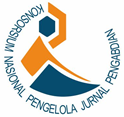Peningkatan Kualitas Pembelajaran Bahasa Arab pada Tingkat Madrasah Diniyah Tanwirul Futuh Kabupaten Pasuruan
Abstract
This community service activity aims to improve the quality of Arabic learning for Madin teachers so that students are more motivated and active in the learning process. The form of implementing community service is in the form of training and mentoring in the use of Arabic language learning methods and strategies so that the learning process is more active and varied and not boring. The implementation of this community service uses the PRA (Participatory Rural Appraisal) method, by prioritizing the participation of madin teachers in improving the quality of Arabic learning and providing ongoing assistance. The results of community service activities include: (1) Strengthening Arabic learning strategies based on innovative, creative Arabic learning methodologies through socialization and training; (2) Mentoring that is carried out intensively every two months of learning Arabic has produced results, as evidenced by the enthusiasm of the students increasing during the learning process; (3). There is a need for continuous mentoring of madin teachers in learning Arabic so that learning is of higher quality.
Kata kunci— Bahasa Arab, Guru Madin, Kualitas Pembelajaran, Pemberdayaan
Abstract
This community service activity aims to improve the quality of Arabic learning for Madin teachers so that students are more motivated and active in the learning process. The form of implementing community service is in the form of training and mentoring in the use of Arabic language learning methods and strategies so that the learning process is more active and varied and not boring. The implementation of this community service uses the PRA (Participatory Rural Appraisal) method, by prioritizing the participation of madin teachers in improving the quality of Arabic learning and providing ongoing assistance. The results of community service activities include: (1) Strengthening Arabic learning strategies based on innovative, creative Arabic learning methodologies through socialization and training; (2) Mentoring that is carried out intensively every two months of learning Arabic has produced results, as evidenced by the enthusiasm of the students increasing during the learning process; (3). There is a need for continuous mentoring of madin teachers in learning Arabic so that learning is of higher quality.
Keywords— Arabic, Madin Teachers, Quality of Learning, Empowerment
Full Text:
PDFReferences
Abdullah, M., Bakar, N., Sulehan, J., Awang, A., & Liu, O. (2012). Participatory rural appraisal (PRA): An analysis of experience in Darmareja Village, Sukabumi District, West Java, Indonesia. Akademika: Journal of Southeast Asia Social Sciences and Humanities, 82(1), 15–19. https://ejournal.ukm.my/akademika/article/view/827/771
Fauzi, A., & Nikmatullah, C. (2016). Pelaksanaan pendidikan madrasah diniyah di Kota Serang. Jurnal Pendidikan Dan Kebudayaan, 1(2), 157–178. https://doi.org/10.24832/jpnk.v1i2.763
Junanto, S. (2016). Evaluasi pembelajaran di Madrasah Diniyah Miftachul Hikmah Denanyar Tangen Sragen. At-Tarbawi: Jurnal Kajian Kependidikan Islam, 1(2), 177–196. https://doi.org/10.22515/attarbawi.v1i2.176
Nizah, N. (2016). Dinamika Madrasah Diniyah: Suatu Tujuan Hipotoris. Jurnal Penelitian Pendidikan Islam, 11(1), 181–202. https://journal.iainkudus.ac.id/index.php/Edukasia/article/view/810
Salahuddin, M. (2012). Pengembangan Kurikulum Madrasah Diniyah Takmiliyah. Cendekia: Jurnal Kependidikan Dan Ke masyarakat, 10(1), 45–458. https://doi.org/10.21154/cendekia.v10i1.401
Toyyib, R. (2017). Peran Madrasah Diniyah dalam Peningkatan Pendidikan Agama Islam (Studi Tentang Peningkatan Mutu Pendidikan Agama Islam Di Sekolah Menengah Pertama Nurul Jadid Paiton Probolinggo) [Universitas Islam Negeri Maulana Malik Ibrahim Malang]. In E-theses UIN Malang. http://etheses.uin-malang.ac.id/9983/1/15770049.pdf
DOI: http://dx.doi.org/10.17977/um045v4i2p140-143
Refbacks
- There are currently no refbacks.
Email: karinov@um.ac.id

This work is licensed under a Creative Commons Attribution-ShareAlike 4.0 International License.






